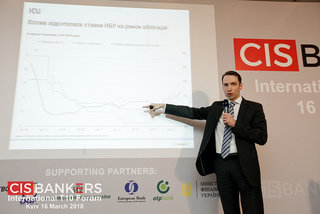
Ruslan Kilmukhametov, Head of Debt Capital Markets at ICU
UKRAINE NEEDS ALL TYPES OF INVESTMENTS – RUSLAN KILMUKHAMETOV
In March, the National Bank of Ukraine increased the discount rate once again, this time to 17%. The impact this had on capital markets was discussed during CIS Bankers T10 Forum by regulators and participants. According to Ruslan Kilmukhametov, Head of Debt Capital Markets at ICU, there is a correlation between NBU’s discount rate and government bond yields. At the moment, investors are trying to digest the recent discount rate increase.
Non-residents also want to take advantage of BISL’s (Bonds of the Internal State Loan) rate increase. As Sergiy Nikolaychuk, Director of Monetary Policy and Economic Analysis Department at NBU, noticed, non-residents have increased their investments to 14.4bn UAH. He also noted that this was helpful to the regulator, along with keeping the exchange rate steady, when it bought foreign currency as reserves to form a cushion of safety.
However, the government bond market still needs further development. “We expect that the Institute of Market Makers on the BISL will start working in the near future, and we will see significant improvements in the how the BISL price is calculated. These changes will bring more liquidity into this market, it will become more stable and predictable, and, most important, it will become more transparent for all investors. Without good liquidity and clear transparent pricing, we cannot attract individuals to this market,” said Timur Khromaev, Chairman of the National Securities and Stock Market Commission.
Ruslan Kilmukhametov is convinced that Ukraine needs all types of investments. “The main feature of “hot” capital is that it comes first, but it leaves first as well. But if a country has good growth prospects, it will attract others, including strategic investors. We just need to create conditions under which they won’t feel the need to leave”.
Among the conditions that Ruslan mentioned is the development of the mechanism of nominal holders in Ukraine, which would allow non-residents to invest in Ukrainian securities using international custodians. This would significantly simplify access to the local market, because at present, a foreign investor must open an account in Ukraine to buy Ukrainian securities. This procedure can take from six to eight months, requires the investor’s presence in the country, and all documents must be translated. And it’s not as though the market will wait for individuals to comply with these bureaucratic nuisances.
Andre Kuusvek, Director, Local Currency and Capital Markets Development at EBRD, thinks it’s a good idea to attract short-term capital. “The market needs different types of investments—hot, long, international, and domestic money. The London Stock Exchange is so big because they have everything—insurers, investment companies, hedge funds, and banks. Access to the market with the help of Clearstream is very important, because it lowers risks for international investors in Ukraine.”
Everyone agrees that Ukraine needs long-term capital from international sources; however, regulators and legislative obstacles interfere with this. The main concern, according to Ruslan Kilmukhametov, is not so much in improving or adopting new laws, but in implementing laws: “Any laws can be adopted and any agreements can be signed at the local and international levels, but if they are not implemented, then attracting long-term, foreign capital to Ukraine will be difficult at best.”












